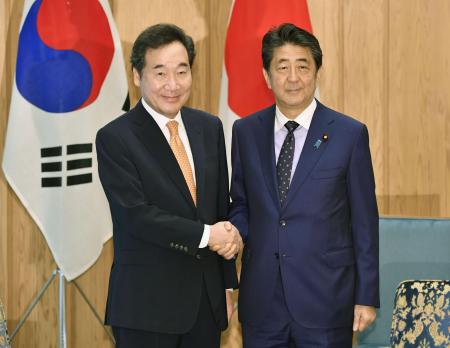 World
World


|
| Japanese Prime Minister Shinzo Abe, right, and his South Korean counterpart Lee Nak Yeon are pictured in Tokyo on Thursday.—KYODO/VNA Photo |
TOKYO — Japanese Prime Minister Shinzo Abe held talks with his South Korean counterpart Lee Nak Yon on Thursday, a meeting closely watched for signs the neighbouring countries can put aside a heated dispute over wartime history that has led to a tit-for-tat trade spat.
Lee, on a visit to Tokyo for Emperor Naruhito's enthronement ceremony on Tuesday, was expected to hand Abe a letter from South Korean President Moon Jae In, extending an olive branch.
Emotions have often reached fever pitch over Japan's colonial rule of the Korean Peninsula from 1910 through the end of World War II in 1945, and disagreements over how to make amends.
Relations dived sharply after South Korea's top court last year ordered Japanese companies to pay reparations for forced labour, despite Tokyo's claim the issue was settled by a 1965 agreement under which it provided Seoul with US$500 million for "economic co-operation."
The court decisions outraged Japan, leading Tokyo to remove Seoul from a list of trusted trade partners and impose stricter export controls on some key materials needed by South Korea's tech industry.
South Korea retaliated by scratching Japan from its own list of trusted partners.
It also said it will terminate a military intelligence-sharing pact with Japan - to the dismay of their mutual ally, the United States - that helps them counter missile threats from North Korea. The General Security of Military Information Agreement, or GSOMIA, is set to expire in November.
As bilateral relations sink to the lowest point in decades, the visit by Lee - who lived in Japan for several years as a news correspondent and speaks the language - is being viewed as an opportunity for detente.
On Wednesday, Lee told Natsuo Yamaguchi, leader of Komeito - which together with the Liberal Democratic Party forms Japan's ruling coalition - that he hopes the meeting with Abe will set the stage for "future-oriented" relations between the countries. — KYODO




